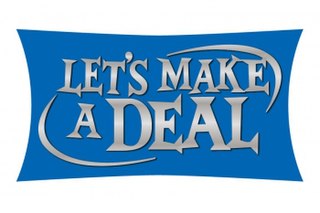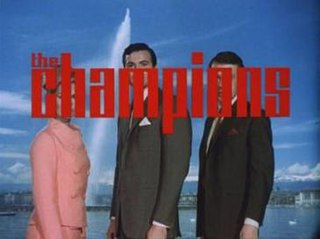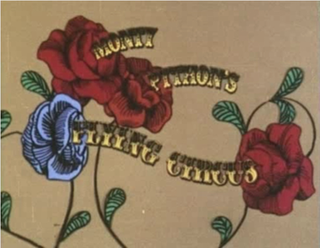Related Research Articles

Monty is an American comic strip created, written and illustrated by cartoonist Jim Meddick. The strip began as Robotman starting February 18, 1985. The title changed to Monty in 2001.
Lorimar Productions, Inc., later known as Lorimar Television and Lorimar Distribution, was an American production company that was later a subsidiary of Warner Bros., active from 1969 until 1993, when it was folded into Warner Bros. Television. It was founded by Irwin Molasky, Merv Adelson, and Lee Rich. The company's name was a portmanteau of the name of Adelson's then wife, Lori, and Palomar Airport.
Broadcast syndication is the practice of content owners leasing the right to broadcast their content to other television stations or radio stations, without having an official broadcast network to air it on. It is common in the United States where broadcast programming is scheduled by television networks with local independent affiliates. Syndication is less widespread in the rest of the world, as most countries have centralized networks or television stations without local affiliates. Shows can be syndicated internationally, although this is less common.

Monty Hall was a Canadian-American radio and television show host who moved to the United States in 1955 to pursue a career in broadcasting. After working as a radio newsreader and sportscaster, Hall returned to television in the U.S., this time in game shows. Starting in 1963, he was best known as the game show host and producer of Let's Make a Deal. He had a conundrum with game theory and psychology aspects named after him: the Monty Hall problem. Behind the scenes, Hall also carried on an active life of philanthropy.

Let's Make a Deal is a television game show that originated in the United States in 1963 and has since been produced in many countries throughout the world. The program was created and produced by Stefan Hatos and Monty Hall, the latter serving as its host for nearly 30 years.

Bewitched is an American fantasy sitcom television series that originally aired for eight seasons on ABC from September 17, 1964, to March 25, 1972. It is about a witch who marries an ordinary mortal man and vows to lead the life of a typical suburban housewife. The show was popular, finishing as the second-rated show in America during its debut season, staying in the top ten for its first three seasons, and ranking in eleventh place for both seasons four and five. The show continues to be seen throughout the world in syndication and on recorded media.

Nash Bridges is an American police procedural television series created by Carlton Cuse. The show stars Don Johnson and Cheech Marin as two Inspectors with the San Francisco Police Department's Special Investigations Unit (SIU).

Love, American Style is an American anthology comedy television series that aired on ABC from September 29, 1969 to January 11, 1974. The series was produced by Paramount Television. During the 1971–72 and 1972–73 seasons, it was a part of ABC's Friday primetime lineup that included The Brady Bunch, The Partridge Family, Room 222, and The Odd Couple. It featured some of the earliest work of future stars Diane Keaton, Sally Struthers, Albert Brooks, and Harrison Ford. Room 222 star Karen Valentine appeared in four episodes. Brady Bunch star Ann B. Davis and The Partridge Family star Dave Madden each appeared in two episodes.

The Champions is a British espionage thriller/science fiction/occult detective fiction adventure television series. It was produced by Lew Grade's ITC Entertainment production company, and consists of 30 episodes broadcast in the UK on ITV during 1968–1969. The series was broadcast in the US on NBC, starting in summer 1968.

Format Films was an animation studio which was founded by Herbert Klynn in 1959 with Jules Engel as vice president, Bob McIntosh and Joseph Mugnaini, all of whom were animators.

Help! ... It's the Hair Bear Bunch! was an American Saturday morning animated television series, created by Joe Ruby and Ken Spears and produced by Hanna-Barbera, which aired for one season on CBS from September 11, 1971, to January 8, 1972. Daws Butler, Paul Winchell and William Callaway voice the three bears that comprise the Hair Bear Bunch, while John Stephenson and Joe E. Ross voice Mr. Eustace P. Peevly and Lionel J. Botch, respectively, the two individuals who patrol the zoo in which the bears live. The series' producer was Charles A. Nichols, with William Hanna and Joseph Barbera directing, and Hoyt Curtin serving as the composer.

She Spies is an American action-adventure television show that ran from July 20, 2002 until May 17, 2004 in two seasons. The show was sold into syndication but the first four episodes premiered on NBC, whose syndication arm was one of the producers. Disappointing ratings during the show's second season led to its cancellation after season two ended. She Spies bore noticeable production and direction similarities with Charlie's Angels and Totally Spies.
NBCUniversal Syndication Studios, formerly known as NBCUniversal Television Distribution, Universal Domestic Television, Studios USA Television Distribution and MCA TV is the television syndication division of NBCUniversal, a division of Comcast, in the United States. Its predecessors include NBC Enterprises, Universal Television Distribution, Multimedia Entertainment, PolyGram Television, and Sky Vision. At some point in its history, it was also known as "NBCUniversal Television & New Media Distribution" and "NBC Universal Television and New Media Distribution.” This unit is possibly the parent for the similarly named "NBCUniversal Domestic Television Distribution" unit.

KAMU-FM is a public radio station in College Station, Texas, United States. It is owned and operated by Texas A&M University, and is a sister station to PBS member KAMU-TV. The two stations share studios at the Moore Communications Center on the university's campus, and KAMU-FM's transmitter is located at adjacent Hensel Park.
Simon Beaufoy is a British screenwriter. Born in Keighley, West Riding of Yorkshire, he was educated at Malsis School in Glusburn, Ermysted's Grammar School and Sedbergh School, he read English at St Peter's College, Oxford and graduated from Arts University Bournemouth. In 1997, he earned an Oscar nomination for Best Original Screenplay for The Full Monty. He went on to win the 2009 Academy Award for Best Adapted Screenplay for Slumdog Millionaire as well as winning a Golden Globe and a BAFTA award.
Stefan Hatos-Monty Hall Productions is a television production company responsible for producing several American game shows in the 1970s and 1980s. The company is best known for its hit series Let's Make a Deal, which aired in several company-produced iterations off and on between 1963 and 1986.
Monty Halls is a British TV broadcaster and marine biologist best known for his BBC Great Escape series Monty Halls' Great Escape, Monty Halls' Great Hebridean Escape and Monty Halls' Great Irish Escape, during which he lived and worked in remote parts of the UK and Ireland with his dog Reuben. Halls' other TV programmes include WWII's Great Escapes, Great Barrier Reef and Lost Worlds with Leo Houlding for Discovery Channel.

Monty Python's Flying Circus is a British surreal sketch comedy series created by and starring Graham Chapman, John Cleese, Eric Idle, Terry Jones, Michael Palin, and Terry Gilliam, who became known collectively as "Monty Python", or the "Pythons". The first episode was recorded at the BBC on 7 September 1969 and premiered on 5 October on BBC1, with 45 episodes airing over four series from 1969 to 1974, plus two episodes for German TV. A feature film adaptation of several sketches, And Now for Something Completely Different, was released in 1971.
References
- ↑ TV Guide Guide to TV . Barnes and Noble. 2004. ISBN 0-7607-5634-1.